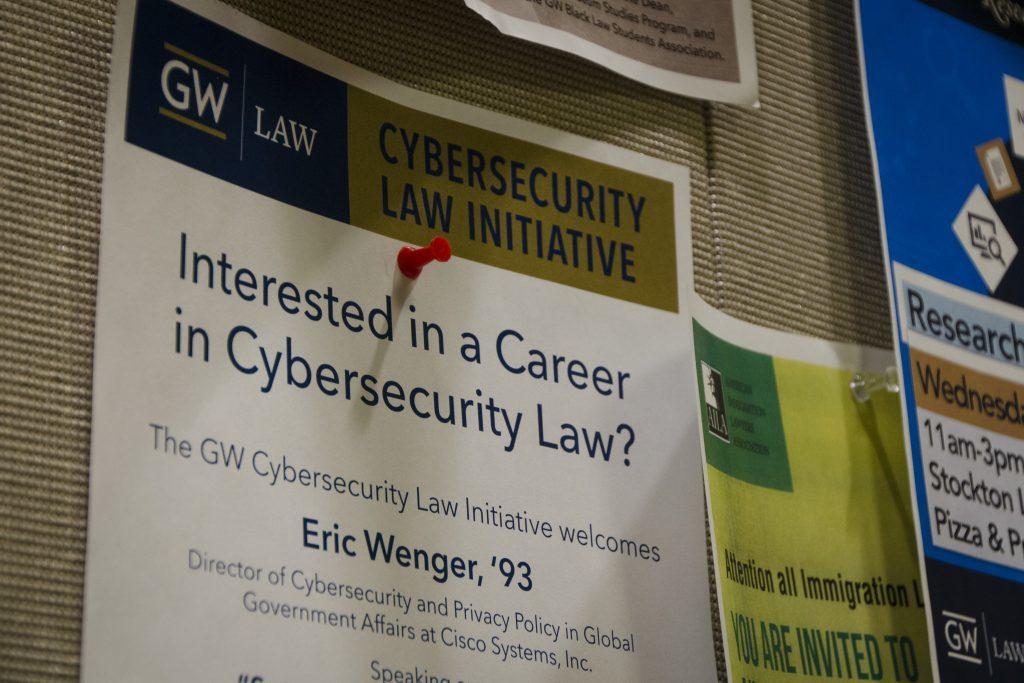The law school started a cybersecurity program to study how law and technology intersect, the program’s director said.
The project will bring law scholars, students and the public together for events, education and discussions about the evolving field of cybersecurity law, faculty said. With Russian cyber attacks attracting international headlines, faculty and experts said the topic is likely to continue increasing in popularity as technology develops.
Orin Kerr, a cybersecurity law professor and the project’s director, launched the program in January with a group of other faculty from the law school, the computer science program and GW’s Cyber Security and Privacy Research Institute.
“It made sense to launch an initiative that would bring the efforts together, bring in people who work in cybersecurity outside the law school and have events and see where we would go in terms advancing the field,” he said.
Kerr said faculty at the law school had talked about creating a center for cybersecurity for several years, and it was launched after about six months of official planning.
The law school has already been at the forefront of studying and interpreting legal issues related to technology and cybersecurity, and the school likely has more cybersecurity experts in its ranks than any other law school in the country, Kerr said.
The program’s first event this week was a discussion with Eric Wenger, the director for Cybersecurity and Privacy on Cisco’s Global Government Affairs team, about finding a career in cybersecurity law. Kerr said raising awareness about career opportunities in cybersecurity and hosting networking opportunities with industry professionals is one of his priorities for the center.
Cybersecurity lawyers have been in high demand in recent years, Kerr said, as the rise of the internet has spawned a whole new category of laws and regulations and a new kind of criminal. There were 1 million worldwide job postings for cybersecurity law in 2015 – many of them filled by millennials – according to a survey commissioned by Raytheon and the National Cyber Security Alliance.
“What’s important is that this is a problem that everyone should be worrying about. There are relatively few lawyers who are informed about this area, and that’s something we’re hoping to change,” Kerr said.
Cybersecurity has been a recent priority in University research. In 2012, the Board of Trustees launched the GW Cybersecurity Initiative to highlight the University’s top programs in the field across disciplines. Last fiscal year, researchers received double the number of National Science Foundation grants to study cybersecurity than they had five years earlier.
Concerns about cybersecurity burst onto the national stage during last year’s presidential race when Russian operatives likely hacked and leaked emails from the Democratic National Committee and former Democratic presidential nominee Hillary Clinton’s campaign officials.
Carl Landwehr, a lead research scientist at the Cyber Security and Privacy Research Institute at GW, said the project would benefit from faculty from across GW’s law and technology programs.
He said that because cybersecurity law is intertwined with technology, it was important for the program to incorporate experts from both the legal and technical sides.
“It is clear to me that we are not going to make a great deal of progress in the field if we don’t have the right incentives in place to influence the development of the technical systems that we build,” Landwehr said. “I think one of the ways of influence is the law.”
The program will attempt to tackle some of the major issues in the field of cyber security law, including concerns about internet privacy, he added.
“To me it’s ironic that there’s huge market now for cyber security professionals and training cyber security professional,” he said. “To me it’s a reflection that we built a lot of fire traps and now we need a lot of firemen. We need to stop building fire traps.”
Paul Rosenzweig, a professorial lecturer in the law school who is affiliated with the project, said future lawyers and technical workers will have to deal with complicated legal questions about artificial intelligence and new technology.
“If you are an undergrad, you probably don’t even know a world without the world wide web,” he said. “What really excites me about cybersecurity, law and policy is that it is one of the most dynamic and engaging and interesting areas to read about, think about and talk about. It’s changing all the time.”





